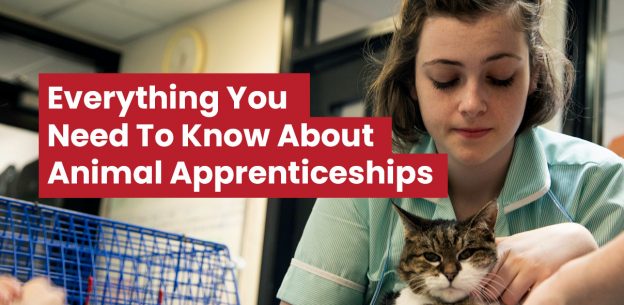For those aspiring to an exciting career working with animals, animal apprenticeships could be an excellent way to gain hands on experience with animals, pick up practical skills and knowledge and earn a wage – all at the same time.
Here, we go through everything you need to know about apprenticeships working with animals. Let’s get started:
What is an apprenticeship?
An apprenticeship is a training programme where you gain practical skills and knowledge by working in a real job, whilst studying a nationally recognised programme at the same time. In many cases, you will also study towards a recognised qualification as part of your programme of study. Simply put, you get paid, you get experience and you get a complete qualification that is relevant to your role!
You will be employed within an organisation and work ideally for a minimum of 30 hours per week. A designated college will then support you in completing your apprenticeship.
Quick facts
- Get paid: Apprentices earn at least the National Minimum Wage for Apprentices if they are under 19 years of age, and for the first 12 months for anyone over the age of 19 (thereafter the normal national minimum wage applies). Many apprentices earn more than this.
- Get a real job – you will be employed for ideally at least 30 hours per week, however it is possible to undertake an apprenticeship part time
- Full time course: The minimum length of an apprenticeship is 12 months but many last longer than this.
- Any age: There is no upper age limit for studying an apprenticeship, but you must be at least 16 years of age to start.
- Study at work: A minimum of 6 hours per week of your time at work will be spent on “off-the-job” training. Find out more about off-the-job training
- Level of study: Apprenticeships start from level 2 and go up to degree level. Many apprentices begin at level 2 and work their way up as they gain experience.
Delivery and assessment
Apprenticeship courses can be delivered in many different ways. Common terms that you may come across include:
- Day release: Attend college one day per week
- Block Release: Attend college in blocks, for example
one week at college every month - Blended Learning: Study both online and in college
- Distance Learning: Study outside of the classroom using online materials, with virtual support from a tutor
- Work-based Learning: Learn in the workplace full-time and receive support from an assessor.
- Functional skills: In addition to the main qualification selected, Functional Skills qualifications in English, Maths will also be studied, unless exempt.
Apprenticeships are assessed by a combination of methods. These may include observations, reflective logs, a portfolio, written assessments and examinations. Additionally, all apprentices in England are assessed at the end of their training via an End Point Assessment (EPA).
EPAs are different for each apprenticeship, however they usually include:
- a practical assessment
- a project
- an interview and presentation
- written or multiple choice tests
Who are apprenticeships for?
Contrary to popular belief, apprenticeships aren’t just for people new to a job! They are a great path for people at any stage of their career – from those re-entering the workforce, to those wanting to reskill or change careers.
So, if you’re considering a career working with animals, perhaps after years of working in a completely different field, studying an apprenticeship could be your ticket to a new role in the animal industry.
In order to undertake an apprenticeship in England, you need to be:
- Aged 16 years or over
- Living and working with England earning at least the Minimum Wage for Apprentices*
- Living within an EU country for at least the last three years
Additional entry requirements vary depending on the job and apprenticeship course in question.
What kind of animal apprenticeships are available?
Whether you’re interested in caring for animals in a veterinary practice as a veterinary nurse, working with dogs in a dog grooming salon or looking after cats in a cattery – there are apprenticeships available in many animal related subjects, that can help you achieve your career goals. Here at The College of Animal Welfare, we offer animal apprenticeships in:
What are the benefits of animal apprenticeships?
For those aspiring to an exciting career working with animals, undertaking an animal apprenticeship could be an excellent way to get started. Take a look at the key reasons why an apprenticeship could be the perfect career move…
- Professional training and qualification Some apprenticeships offer the opportunity to study towards a trusted, industry qualification as part of your programme of study. More than this, you’ll pick up professional skills that are recognised and respected by employers.
- Bright career prospects Many apprentices stay with their employer, gaining more responsibility and a higher salary! According to research by the National Apprenticeship Service, 85% of apprentices will remain in employment on completion of their apprenticeship, with 64% of those staying with the same employer.*
- No course fees Your course and training fees will be covered by your employer. You won’t have to pay a penny!
- Develop networks You will gain amazing insight into your industry and develop professional networks!
- Pave the way to higher study Many apprentices goon to study a higher level apprenticeship, or study at university.
- Become one of the team You will receive a regular income, paid holiday and all the other benefits that come with a job!
Is an animal apprenticeship right for you?
Is working with animals for me?
Before pursuing any new job or career, it’s important to do your research, to make sure that the career you’re interested in fits with your personal qualities, goals and ambitions. You can decide whether a career working with animals is for you by:
- Attending careers events and college open days
- Taking a short class or course in animal care
- Researching careers with animals online
- Gaining experience working with animals
- Asking people who’re already working in the animal industry
Read our blog post about deciding if working with animals is for you
Is apprenticeship training for me?
Apprenticeship training can be an effective way to get a foot in the door on a new career; however, they aren’t the right path for everyone. You should consider factors such as:
- Finances: How will you cover the cost of living as an apprentice?
- Transport: How will you get to work or to college? You may need to consider travelling or relocating for the right opportunity.
- Finding a role: Apprenticeships working with animals can be competitive, so you may have to be willing to wait for the right role, or be proactive in finding a position yourself.
How to Find an Apprenticeship Working With Animals
The first step to becoming an apprentice is gaining employment. There are several ways you can do this:
- Search via the Find an Apprenticeship service. Most apprenticeship vacancies are displayed on the ‘Find an apprenticeship’ website. This website is where training providers post apprenticeship vacancies. On this website you can search by location or keywords to find your ideal vacancy. Once you have found an apprenticeship that interests you, create an account via the website to apply!
- Search for apprenticeship vacancies in your local newspaper or online using websites such as Indeed or Reed.
- Attend free careers events run by your local school, library or job centre, to discuss the apprenticeship vacancies available locally.
- Contact companies directly and find out if they would consider taking on an apprentice.
Once you have found a suitable position you can then contact the training provider to arrange starting the apprenticeship.
How to Choose the Right Animal Apprenticeship for you
All apprenticeships are a little bit different, so it’s crucial to do your research to ensure you find the best apprenticeship for you.
Whilst apprenticeships come with lots of opportunity, you also have to appreciate that you’ll be starting a new job and getting to grips with studying a programme. So, it’s an important decision to make – no matter what path you want to follow, always do you research first.
Key points to investigate
- What is the apprenticeship and job role – does it fit what you’re looking for?
- Find out about the employer – is it the type of company you want to work for?
- Find out about the training providers, colleges, or universities that offer animal apprenticeships, and where you could be studying.
- What qualifications, subjects, and grades are they looking for?
- What essential and desirable skills and experience do they ask for, and what qualities are they are looking for in applicants?
- For you, what are the three most and least positive aspects of this apprenticeship or job opportunity?
Applying for Animal Apprenticeships
Animal apprenticeships can be really competitive. Once you’ve found a suitable apprenticeship for you, it’s important to make sure your application is up to scratch ready for your application.
CV Writing
CV writing skills are key for job seekers looking to increase their employability prospects. Master them, and you’ll be on the way to landing your chosen apprenticeship. Your CV is one of the most important professional documents you produce – but it’s also one of the most difficult to get right. It needs to look professional, be easy to read and show off the best of your skills and experience. Take a look at our comprehensive advice and CV writing tips
Interviewing
If you’ve been invited to interview, this is your chance to show the organisation what you have to offer and why they should pick you to undertake their animal apprenticeship. You are likely to feel a little nervous about your interview – don’t worry, this is normal! However there are several things you can do in advance to help you feel more prepared:
- Research the organisation. What size are they? What products or services do they offer? Have they recently won any awards or accreditations? Often checking out their website is a good place to start, they may even have a ‘News page’ so you can see their latest activities!
- Check the location of the interview and plan how you are going to get there. Aim to arrive 10 minutes early so you don’t feel rushed. Make sure you allow for any traffic delays.
- Have your interviewers contact details to hand, this means that if you are unexpectedly delayed at least you can call ahead to let your interviewer know.
- Most interviewers will ask if you have any questions. Prepare a minimum of three questions that you want to ask. It is unlikely that they will have all been answered throughout the interview and it is important to be interested and have something to ask!
- Consider typical interview questions (as below) and prepare your answers. Where possible give example of things that you have done that show you have the right skills for the role.
Interview questions fall into four main categories:
- Questions about you
- Work experience and knowledge questions
- Questions about why you want THIS job
- Competency-based questions about the role.
Things to think about on the day:
- Be clean and presentable. Dress code should be smart formal, therefore you should try and avoid casual clothing!
- Take a pen and notebook with you – your mobile should not be on display and be on silent at all times.
- Be attentive. Smile and shake hands with the interviewer. Throughout the interview be aware of your posture, don’t slouch or you will look disrespectful and uninterested in the role.
- When answering questions speak clearly and don’t swear! Take your time to answer the question, if necessary take a deep break and pause rather than jump in with an answer. If you are unsure of the question then ask for clarification.
- Once the interview has been completed don’t forget to thank the interviewer for their time and ask when a decision is likely to be made.
Additional Apprenticeship Resources
- Apprenticeships at CAW
- Off-the-job training guidance for apprentices
- Government Apprenticeship Finder
Follow us on social media to be the first to see new blog posts and careers advice…
[ss_social_follow networks=”facebook;twitter;instagram;pinterest;linkedin”]




